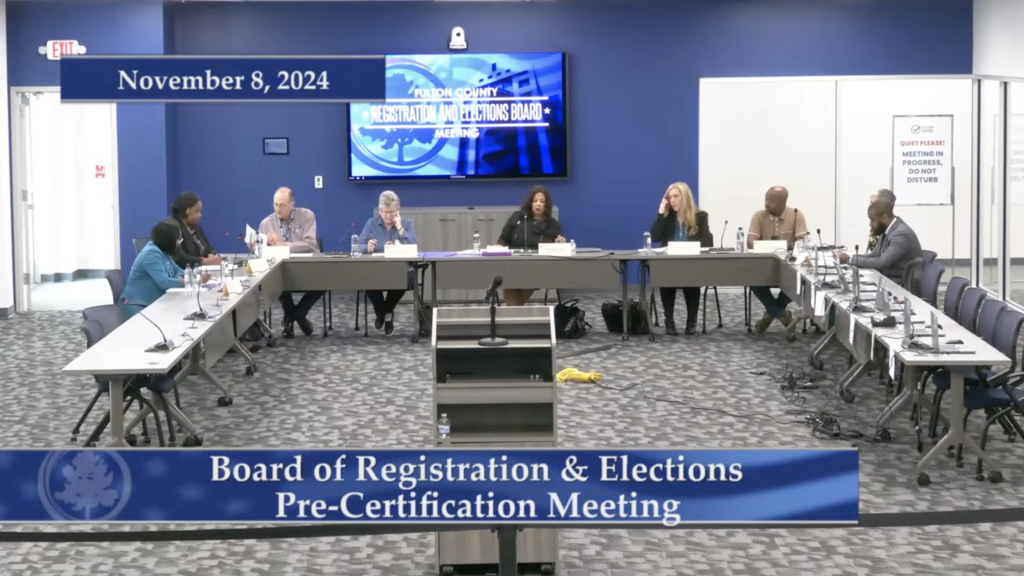Originally Authored at TheFederalist.com

On Nov. 12, the Fulton County Board of Registration and Election (FCBRE) certified the results of the 2024 election. Except no one knows with certainty if the results were actually accurate because crucial data was withheld, according to a member of the board.
President-elect Donald Trump won the Peach State but lost Fulton County to Vice President Kamala Harris by 240,097 votes. The results were then certified on Nov. 12, but board members, who are considered the superintendents of elections, weren’t given access to all the requested election-related documentation, FCBRE member Julie Adams told The Federalist.
“I, along with all my board members, did not receive the Numbered List of Electors (the actual names along with their voter register numbers, by precinct and by the method in which they voted) or a list of the number of votes cast, by precinct or by vote method,” Adams said. “So, I have no idea who voted and the votes cast.”
The Numbered List of Electors and the Cast Votes Records, which shows the number of votes cast by precinct and vote method, is required for board members, like Adams, to ensure that there were not more votes cast than voters who voted. It’s a basic process known as reconciliation that happens before certification.
Nonetheless, Adams, along with the other board members, were forced to certify the results of the election. Fulton County Superior Judge Robert McBurney ruled in October that election superintendents may not “refuse to certify or abstain from certifying election results under any circumstance” even if there is a “non-sensical result.”
McBurney agreed that “If … an election superintendent (or member of a board of elections and registration) determines a need for election information from the staff of the superintendent’s office (or of the board), that information, if not protected from disclosure by law, regulation, or rule, should be promptly provided.”
Nonetheless, McBurney ruled the certification deadline could not be ignored due to any delays in access to the election-related material.
Adams explained that she was given the ability to view certain election-related documentation on the Friday and Tuesday after Election Day but that it wasn’t enough time to “analyze data for the largest county in Georgia.” Adams said she was only permitted to write down the data she was reviewing, but wasn’t permitted to take photos, or have copies of her own or receive anything electronically.
“And we never had the completed Numbered List of Electors or the Numbered List of Votes Cast, both by precinct and by vote method. The thing missing was clearly the most important thing,” Adams said. “We didn’t have anything, including the Numbered List of Absentee Voters (which includes mail-in and [overseas ballots].”
Adams says the election director, Nadine Williams, is in charge of providing the documents to board members but that there was a delay in producing the reports because the board had to adjudicate more than 8,000 ballots that failed to credit qualified write-in candidates. Adams says she repeatedly asked Williams about the status of the documents she requested but ultimately never received them.
Williams did not respond to a request for comment at the time of publication.
Adams says she feared that not voting “yes” on certification could lead her to face “criminal charges” or “lawsuits.” Adams was previously threatened by the Democrat Party of Georgia in March after she refused to rubber-stamp the results of the presidential preference primary without getting election-related documents. Adams filed a suit in May in response, seeking clarification about whether her role is discretionary — meaning she and other members should only certify the results if they are confident the election was administered in accordance with the law — rather than ministerial — meaning members must rubber-stamp the results regardless of any concerns.
“I was warring with my thoughts,” Adams said about her thoughts when voting “yes” to certify. “First I was thinking: ‘Couldn’t I be held legally liable for a vote either way? I have a court order that says I have to say ‘Yes,’ but I have an oath that says ‘I will make a true and perfect return.’ I am in legal jeopardy no matter what I do. It is a very uncomfortable feeling: I am on a voluntary board and am risking legal jeopardy.”
And for Adams, it’s not about who won — it’s how they won.
“My president won; I want to go on the record that I proudly voted for President [Donald] Trump. I would have questioned and wanted to verify the results no matter who won,” Adams said. “My focus is for Fulton County Elections to be free, fair, and transparent. And despite President Trump winning, I still have questions about elections being free, fair and transparent. They haven’t been transparent to me, as a member of the board of elections. Clearly they haven’t been transparent to voters and candidates.”
Just this past May the State Election Board reprimanded the county for violating election law in 2020 after it was discovered the county double-scanned more than 3,000 ballots during the 2020 recount. Two Republican members of the FCBRE did not vote to certify the results, as noted by The Federalist’s Editor-in-Chief Mollie Hemingway in her best-seller Rigged: How the Media, Big Tech, and the Democrats Seized Our Elections.
The county also failed to count 1,326 votes during the 2022 primary, resulting in the county having to re-certify the results after discovering the discrepancy, according to the Atlanta-Journal Constitution.
Brianna Lyman is an elections correspondent at The Federalist. Brianna graduated from Fordham University with a degree in International Political Economy. Her work has been featured on Newsmax, Fox News, Fox Business and RealClearPolitics. Follow Brianna on X: @briannalyman2
